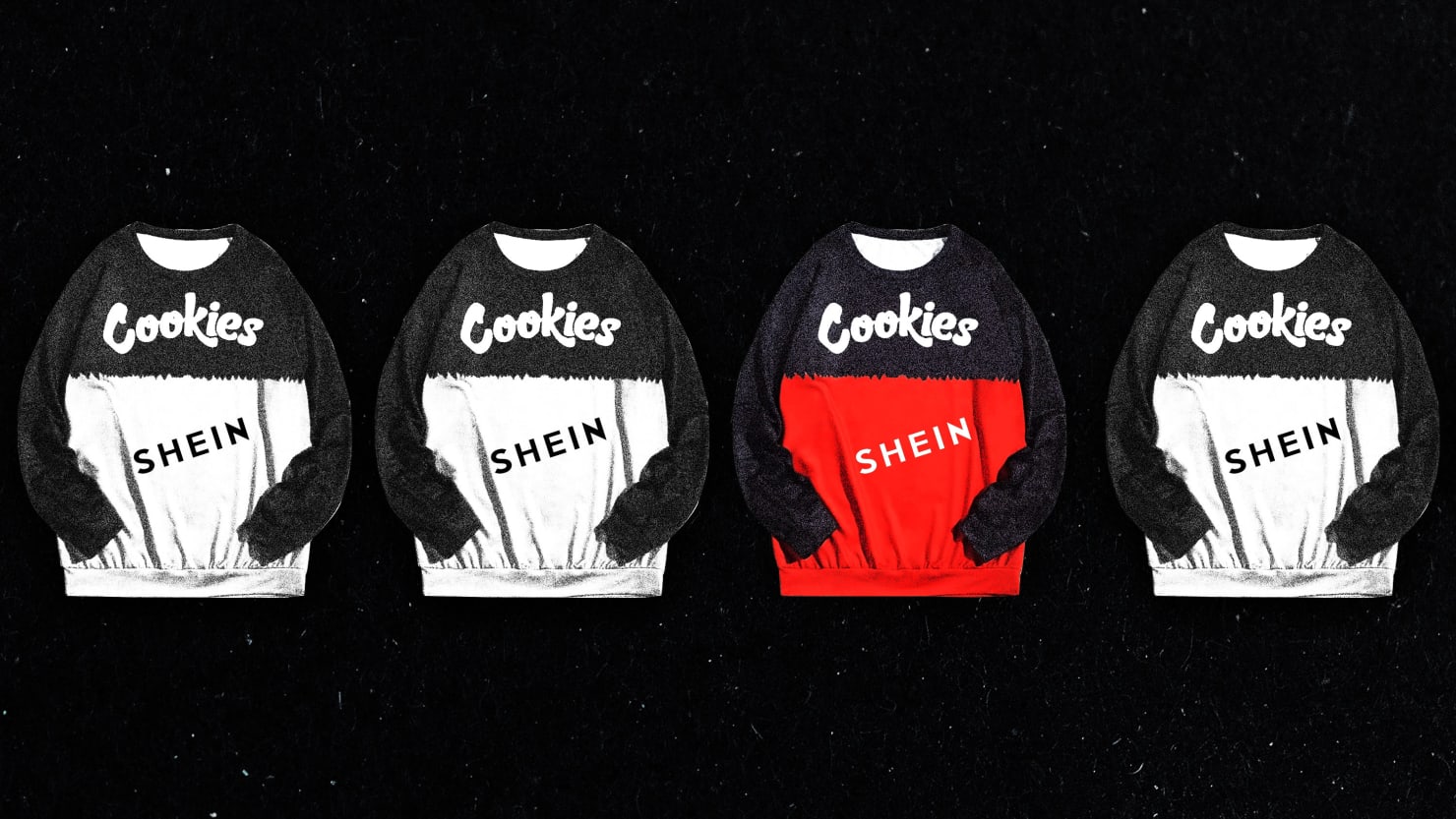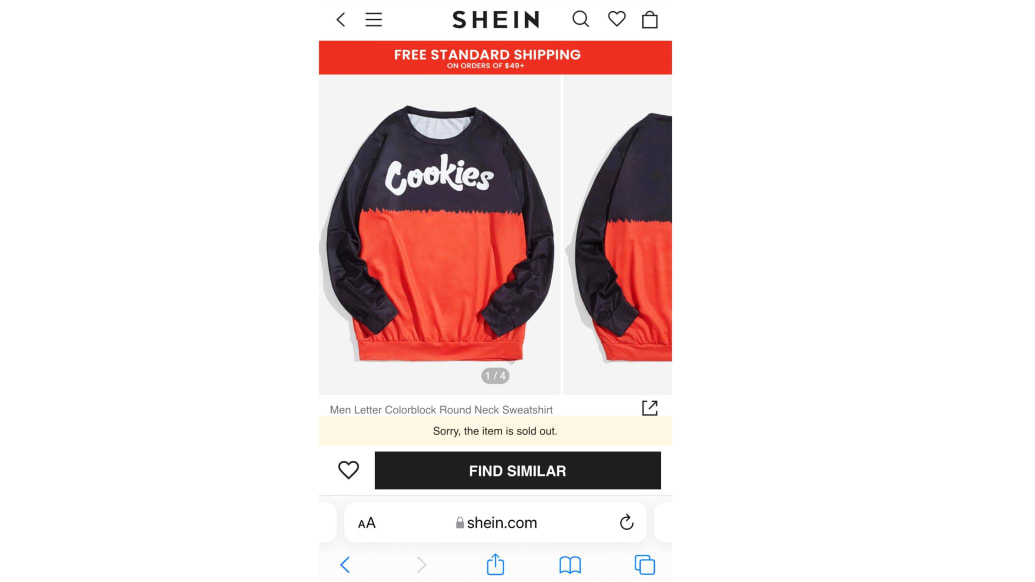Fashion Giant Shein Sued for Stealing Weed Brand Cookies’ Sweatshirt Design – The Daily Beast

The story is now so commonplace that it’s become a fashion cliché: whether it’s an independent creator with an Etsy shop or an iconic brand that employs a vast team of creatives, at some point, a link to an item for sale on Shein is shared in an email or DM or text. “Hey,” the message from a confused colleague or customer might read. “Isn’t this your design?”
Cookies SF, a popular clothing brand launched in 2011 by the co-founder of the billion-dollar American weed brand Cookies, filed a lawsuit against Shein on Nov. 2 that accuses the Chinese fast fashion juggernaut—the retailer generated $15.7 billion in 2021—of trademark infringement and counterfeiting. At issue is a sweatshirt that was at one point offered for sale on Shein’s website which, Cookies SF alleges, precisely reproduces its trademarked Cookies Mark: the distinctive, looping logo that appears on nearly all of its apparel.
Cookies co-founder Gilbert Milam Jr., best known by his rapper moniker Berner, was unavailable for comment.
Cookies SF is just the latest in a long list of incensed companies to accuse Shein of ripping off, manufacturing and selling their original ideas at an astonishing speed, but a charge of counterfeiting goes beyond an accusation of trademark infringement or intellectual property theft: while both trademark infringement and counterfeiting describe unauthorized use, a counterfeit is defined as “a spurious mark which is identical with, or substantially indistinguishable from, a registered mark.”
In other words, trademark infringement can be unintentional, but counterfeiting is inherently deceptive. The streetwear brand Stüssy also sued Shein for counterfeiting in March.
According to the Wall Street Journal, since 2020, Shein has been named as a defendant in over 50 U.S. federal lawsuits accusing the company of trademark infringement or copyright infringement. High-profile plaintiffs include Levi Strauss and Ralph Lauren, the latter of which accused Shein of selling items bearing a logo that looked “confusingly similar” to its classic polo player trademark; less-well-known creatives such as Bailey Prado, who accused the retailer of copying her handmade crochet designs, are saying they’ve been ripped off too.
“I was expecting to find only one of my designs copied,” by Shein, Prado told Dazed last year. “When I saw the whole collection and started recognizing each piece, knowing where they came from, I was shocked and didn’t feel like it was real. I was simply in shock.”

Handout / Screenshot
Maggie Stephenson, a freelance artist, sued Shein this summer for $100 million over an allegedly stolen design. Stephenson was unavailable for comment.
Whether you’re a small business owner or a billion-dollar brand, Shein’s sophisticated trend-trawling algorithm can seek out and target any design online that customers are likely to respond to, analysts say.
Many disputes between designers and Shein have been settled for undisclosed amounts, and not one infringement case against Shein has ever made it to a courtroom.
“Our client will bring this case to trial and force Shein to face a jury for the first time, and there is no amount that can change that,” attorney Jeff Gluck, a lawyer with a reputation for representing a series of streetwear brands that now includes Cookies SF, told The Daily Beast. The brand is seeking “enforcement of their rights to the fullest extent, including but not limited to maximum damages for alleged willful counterfeiting,” Gluck said.
“Shein’s notorious and well-documented business model depends upon willful violations of the rights and interests of independent artists and designers,” the Cookies SF lawsuit states.
“Shein takes all claims of infringement seriously,” the retailer told The Daily Beast in a statement. “It is not our intent to infringe anyone’s valid intellectual property and it is not our business model to do so. Shein suppliers are required to comply with company policy and certify their products do not infringe third-party IP. We continue to invest in and improve our product review process.”
“Cookies doesn’t really have that much of a financial interest in pursuing a claim all the way to a judgment,” Douglas Hand, a partner at Hand Baldachin & Associates and an adjunct professor of Fashion Law at NYU, told The Daily Beast.
“I say that because Cookies makes its money selling weed, not selling hoodies,” Hand said. “They may promote their branded weed products through these hoodies, but arguably Shein is only helping in that regard, ironically, by appropriating the trademark. I give Cookies great deal of credit for bringing this claim, and I would hope that they would pursue it all the way, but the business justification for it may not be there if what Shein comes back with is a healthy settlement offer.”
“I would expect that Cookies would be asking for and perhaps would get a six-figure settlement in connection with this dispute,” Hand said.
Even if the Cookies dispute does make it to trial, there’s almost certainly no individual suit that could take Shein down or change the company significantly, Susan Scafidi, the academic director of the Fashion Law Institute at Fordham University, told The Daily Beast.
“Shein is regularly accused of knocking off designs, but what they’ve really knocked off is an entire business model—the fast fashion business model of a couple of decades ago,” Scafidi said. “These lawsuits are simply treated as the cost of doing business. It takes a long time to negotiate a license to use somebody else’s work up front, so you wait for the lawsuit and pay out on the back end. It’s essentially an involuntary license.”
Copyright :

